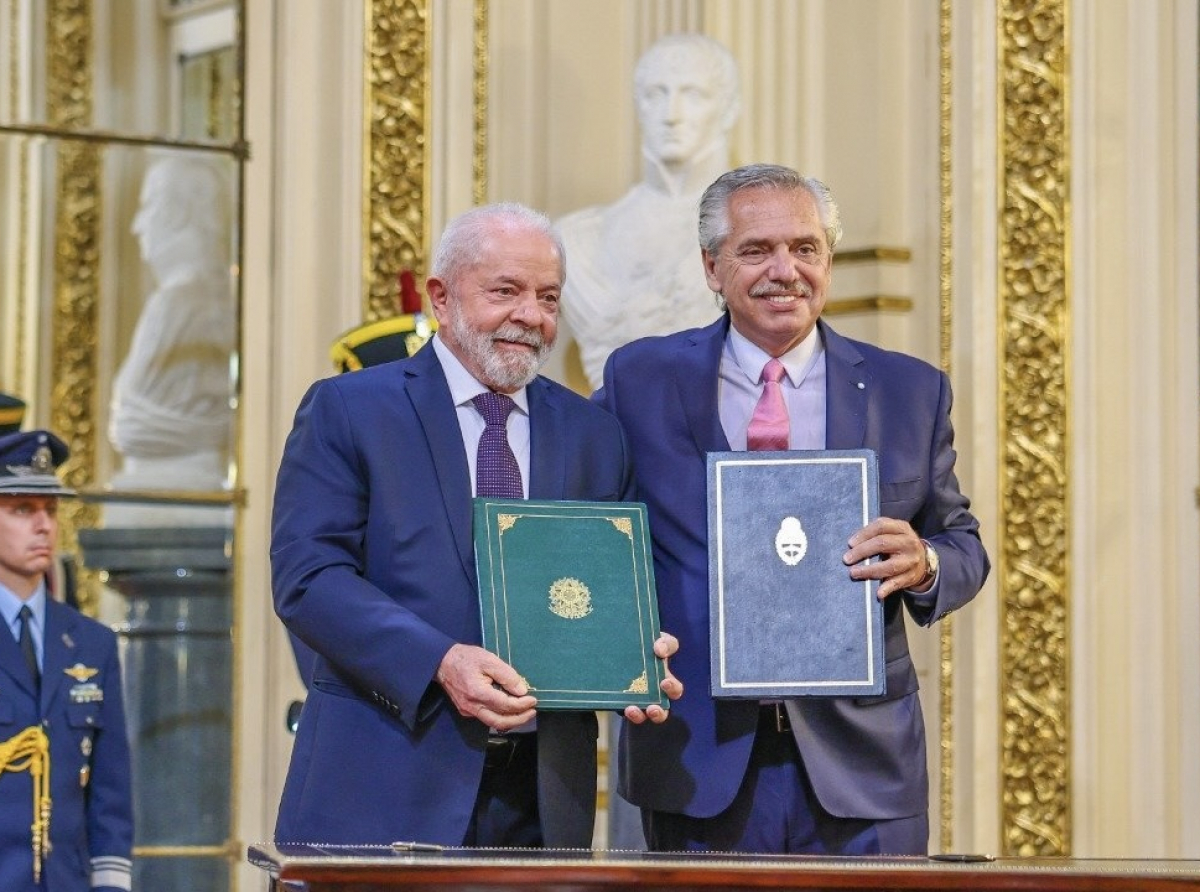The governments of Argentine President Alberto Fernández and Brazilian President Luiz Inácio Lula da Silva have officially rejoined the Union of South American Nations (UNASUR), a regional integration organization founded in May 2008.
On Wednesday April 5, Argentine Foreign Minister Santiago Cafiero announced the country’s official return to the regional intergovernmental body after 4 years of absence.
“By sovereign decision, Argentina returns to UNASUR as a member state to promote its institutional revitalization and build an increasingly integrated region,” Cafiero wrote.
He also reported that President Fernández’s decision had been communicated to the foreign ministers of the member states Bolivia, Guyana, Suriname, and Venezuela.
In an official statement, Cafiero added that “the sovereign decision redrew the path initiated through the communication of denunciation of the Constitutive Treaty of the UNASUR, made on April 12, 2019 by the Argentine Republic,” referring to the measure taken by the government of former President Mauricio Macri (December 2015-2019) with which Argentina withdrew from the bloc.
“For the Argentine government, any instance that brings together national decision-making power and consolidation of an increasingly integrated region, with greater intra-zone trade and better levels of cooperation in pursuit of its development, is crucial,” the foreign minister stressed.
Cafiero further added that “integration blocs are very important to ensure that Latin America and the Caribbean continue to be the zone of peace that is most densely populated in the world, precisely at a time when the planet is showing serious signs of fragmentation and instability.”
Argentina’s decision came a day after President Fernández insisted on the need to “recreate UNASUR” during a meeting in Santiago with his Chilean counterpart Gabriel Boric.
Likewise, on Thursday April 6, President Lula signed a decree officializing Brazil’s return to the UNASUR, also after four years.
“In a moment of resumption of its major international alliances, Brazil will once again be part of the UNASUR. Decree No. 11,475, signed by President Luiz Inácio Lula da Silva and published in the Official Gazette on Thursday, April 6, promulgates the Constitutive Treaty of UNASUR, which will enter into force on May 6, 2023, and will put the country back in the group created during President Lula’s second administration,” reported Brazil’s foreign ministry.
The measure marked a significant step in President Lula’s drive to reposition the country’s politics regionally and internationally after the four years of conservative rule of former president Jair Bolsonaro (January 2019-December 2022), who withdrew Brazil from the bloc in April 2019.
Brazil’s decision came a day after the member states of the Alliance of Latin American and Caribbean Countries against Inflation (APALCI), including Brazil and Argentina, agreed to join efforts to face the inflation crisis and strengthen regional integration and trade.
The heads of state had expressed their intention to return to the regional bloc last month. On March 16, during a ceremony to commemorate the 50th anniversary of the treaty that created the Itaipu hydroelectric dam on the border between Brazil and Paraguay, President Lula stated that one of his government’s diplomatic missions was to reorganize UNASUR.
Similarly, on March 21, during an event organized by the Puebla Group as a part of the III World Forum for Human Rights, President Fernández announced for the first time that his country would soon return to the UNASUR.
What is UNASUR?
UNASUR is a regional integration mechanism, created during the wave of progressive governments in Latin America and the Caribbean in the 2000s. It was formalized on May 23, 2008, under the leadership of late former Venezuelan President Commander Hugo Chávez, and entered into force through a constitutive treaty on March 11, 2011. Its objective is to build integration in the cultural, economic, social and political areas while respecting the diversity of each of the member nations.
UNASUR originally consisted of 12 Latin American countries: Argentina, Bolivia, Brazil, Chile, Colombia, Ecuador, Guyana, Paraguay, Peru, Suriname, Uruguay and Venezuela, equivalent to 400 million people, with the vision of a Latin American identity based on the principle of unity in diversity.
Between 2018 and 2020, Argentina, Brazil, Chile, Colombia, Ecuador, Paraguay, Peru and Uruguay, under the leadership of conservative heads of state, withdrew from the organization due their alignment with US imperialist interests. In November 2019, following the civic-military coup against the democratically elected president Evo Morales, the de-facto government led by Jeanine Áñez withdrew Bolivia from UNASUR. In November 2020, after the return of democracy with the election of President Luis Arce in Bolivia, the country rejoined the regional body. In August 2021, the government of former Peruvian President Pedro Castillo also announced his country’s reincorporation into the bloc. However, following his ouster and arrest in December 2022, the de-facto government of Dina Boluarte suspended Peru’s membership.
With Argentina and Brazil’s return, the bloc is set to gain strength, and with the encouragement of their heads of state, it is expected to regain some more members this year.
Date and Author: April 08, 2023 by Tanya Wadhwa
Source: https://peoplesdispatch.org/


